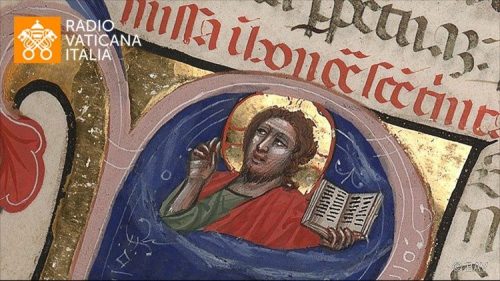READING OF THE DAY
A Reading from the Firts Letter of John
1 JN 3:22–4:6
Beloved:
We receive from him whatever we ask,
because we keep his commandments and do what pleases him.
And his commandment is this:
we should believe in the name of his Son, Jesus Christ,
and love one another just as he commanded us.
Those who keep his commandments remain in him, and he in them,
and the way we know that he remains in us
is from the Spirit whom he gave us.
Beloved, do not trust every spirit
but test the spirits to see whether they belong to God,
because many false prophets have gone out into the world.
This is how you can know the Spirit of God:
every spirit that acknowledges Jesus Christ come in the flesh
belongs to God,
and every spirit that does not acknowledge Jesus
does not belong to God.
This is the spirit of the antichrist
who, as you heard, is to come,
but in fact is already in the world.
You belong to God, children, and you have conquered them,
for the one who is in you
is greater than the one who is in the world.
They belong to the world;
accordingly, their teaching belongs to the world,
and the world listens to them.
We belong to God, and anyone who knows God listens to us,
while anyone who does not belong to God refuses to hear us.
This is how we know the spirit of truth and the spirit of deceit.
GOSPEL OF THE DAY
From the Gospel according to Matthew
MT 4:12-17, 23-25
When Jesus heard that John had been arrested,
he withdrew to Galilee.
He left Nazareth and went to live in Capernaum by the sea,
in the region of Zebulun and Naphtali,
that what had been said through Isaiah the prophet
might be fulfilled:
Land of Zebulun and land of Naphtali,
the way to the sea, beyond the Jordan,
Galilee of the Gentiles,
the people who sit in darkness
have seen a great light,
on those dwelling in a land overshadowed by death
light has arisen.
From that time on, Jesus began to preach and say,
“Repent, for the Kingdom of heaven is at hand.”
He went around all of Galilee,
teaching in their synagogues, proclaiming the Gospel of the Kingdom,
and curing every disease and illness among the people.
His fame spread to all of Syria,
and they brought to him all who were sick with various diseases
and racked with pain,
those who were possessed, lunatics, and paralytics,
and he cured them.
And great crowds from Galilee, the Decapolis, Jerusalem, and Judea,
and from beyond the Jordan followed him.
WORDS OF THE HOLY FATHER
Dear Brothers and Sisters, Good morning!
Today’s Gospel passage (cf. Mt 4:12-23) recounts the beginning of Jesus’ preaching in Galilee. He leaves Nazareth, a village in the mountains, and settles in Capernaum, an important centre on the lakeshore, inhabited largely by pagans, a crossroads between the Mediterranean and the Mesopotamian inland. This choice indicates that the beneficiaries of his preaching are not only his compatriots, but those who arrive in the cosmopolitan “Galilee of the Gentiles” (v. 15, cf. Is 9:1): that’s what it was called. Seen from the capital Jerusalem, that land is geographically peripheral and religiously impure because it was full of pagans, having mixed with those who did not belong to Israel. Great things were not expected from Galilee for the history of salvation. Instead, right from there — precisely from there — radiated that “light” on which we meditated in recent Sundays: the light of Christ. It radiated right from the periphery.
Jesus’ message reiterates that of the Baptist, announcing the “kingdom of heaven” (v. 17). This kingdom does not involve the establishment of a new political power, but the fulfillment of the Covenant between God and his people, which inaugurates a season of peace and justice. To secure this covenant pact with God, each one is called to convert, transforming his or her way of thinking and living. This is important: converting is not only changing the way of life but also the way of thinking. It is a transformation of thought. It is not a matter of changing clothing, but habits! What differentiates Jesus from John the Baptist is the way and manner. Jesus chooses to be an itinerant prophet. He doesn’t stay and await people, but goes to encounter them. Jesus is always on the road! His first missionary appearances take place along the lake of Galilee, in contact with the multitude, in particular with the fishermen. There Jesus does not only proclaim the coming of the kingdom of God, but seeks companions to join in his salvific mission. In this very place he meets two pairs of brothers: Simon and Andrew, James and John. He calls them, saying: “Follow me, and I will make you fishers of men” (v. 19). The call reaches them in the middle of their daily activity: the Lord reveals himself to us not in an extraordinary or impressive way, but in the everyday circumstances of our life. There we must discover the Lord; and there he reveals himself, makes his love felt in our heart; and there — with this dialogue with him in the everyday circumstances of life — he changes our heart. The response of the four fishermen is immediate and willing: “Immediately they left their nets and followed him” (v. 20). We know, in fact, that they were disciples of the Baptist and that, thanks to his witness, they had already begun to believe in Jesus as the Messiah (cf. Jn 1:35-42).
We, today’s Christians, have the joy of proclaiming and witnessing to our faith because there was that first announcement, because there were those humble and courageous men who responded generously to Jesus’ call. On the shores of the lake, in an inconceivable land, the first community of disciples of Christ was born. May the knowledge of these beginnings give rise in us to the desire to bear Jesus’ word, love and tenderness in every context, even the most difficult and resistant. To carry the Word to all the peripheries! All the spaces of human living are soil on which to cast the seeds of the Gospel, so they may bear the fruit of salvation.
May the Virgin Mary help us with her maternal intercession to respond joyfully to Jesus’ call, and to place ourselves at the service of the Kingdom of God.
(Angelus, 22 January 2017)

